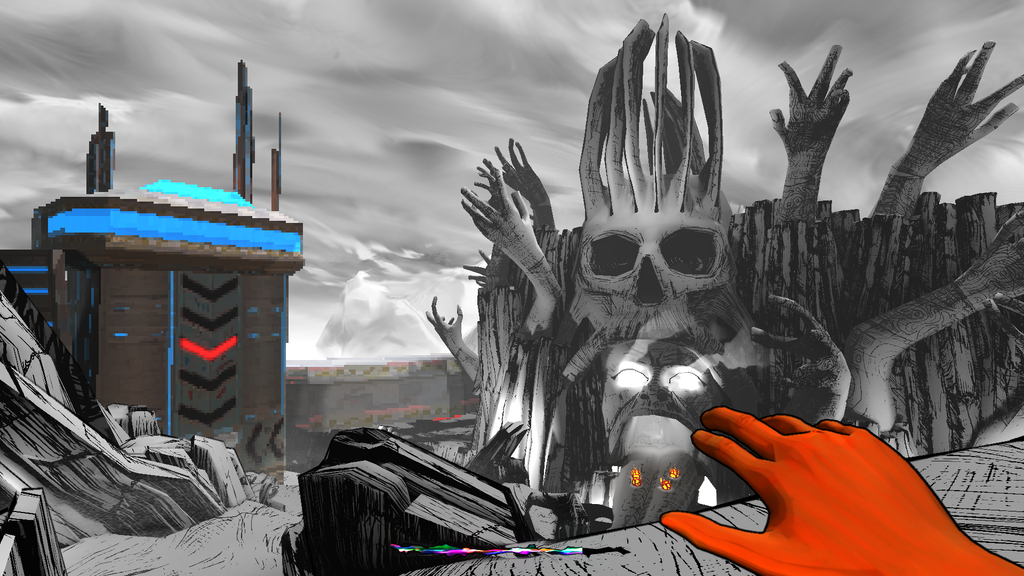
If words could kill, by the time the credits roll there'd be as many dead players as there were developers.

Once in a while it tips into outright venom, however. Everyone has a point but nobody's right, everyone's cause is just but everyone's entirely deluded. It also makes a point of ensuring that almost all its small cast have horrendous attributes as well as evident charm and intelligence. In the main the tone and tale - provided via voiceovers in cutscenes and 'hidden' audiologs - is playful and comic. It's about how games development can go wrong if the goal is not clear, about the oft-dangerous conflation of a commercial project aimed at an audience of millions with a takes-as-long-as-it-takes creative accomplishment intended to be its creator's lasting legacy. The Magic Circle is probably about all those things, and the many guises they can adopt in studios the world over. One minute I'd swear blind it was a reflection of lead designer Jordan Thomas' time in charge of the potentially poison chalice that was BioShock 2 (which turned out solid but fearful in the end), another that it was about Ken Levine's alleged perfectionist tendencies on BioShock Infinite, another that it was shooting the many fish inside a Duke Nukem Forever-shaped barrel, another still that it was about Richard Garriot's propensity for making his games into living monuments to himself. Diversions into retro proto-3D worlds give it a sense of history, and your ability to add colour to certain parts and inhabitants of the bleached world make you feel like so much more than a tourist.Īs for its commentary, if The Magic Circle has a precise target in mind for its barbs about creative over-indulgence, its swipe is broad enough that a relative outsider such as I couldn't pinpoint exactly who or what it was. Its primarily monochrome world sells the idea of an unfinished, partially abandoned space well, and the many vast but purely decorative statues towering above its landscape speak to the skyscraping ambition/folly of its creators. Visually, it's wonderful, and a true melding of theme with appearance and even mechanics. Like The Stanley Parable, it's a game about games, but it goes further - it's a game about game-making. The sadly-canned Black Glove seemed like a response to the perennial question of 'why does something as thematically and aesthetically interesting as BioShock have to be limited to first-person-shooting?'Īnd The Magic Circle, from much-respected BioShock (and Thief) veteran Jordan Thomas, is concerned with what happens when developers' ambition (or ego) gets out of hand, as well as chewing over how much agency a player should be given within someone else's creation. The Flame In The Flood is about suddenly finding your life in tatters and trying to craft your own way out of the wreckage. Here's what I think.Īs a mere spectator of the fallout, it's hard not to see autobiography in the various post-Irrational, post-BioShock Infinite projects. The real Magic Circle that is, not the fictional one. Now you are inside this half-made game, exploring what it is and what it was, how it ran aground, whether it belongs to its creators or its players, and perhaps either redeeming it or destroying it. Those few staff who still work on it either desperately want out or refuse to abandon their impossible dreams. After years of development hell, The Magic Circle's fans look upon it with a mixture of breathless anticipation and derision. A first person puzzle/exploration/action game about a fictional game also called The Magic Circle, to be precise. August, 2009.The Magic Circle is a game about an unfinished game.

Masters Thesis, IT University of Copenhagen.

Towards Tailoring the Emotional Experience in a Physical Wii Game through Artificial Neural Networks based on Physiology and Gesture Data. Abusing the Player, and Making Them Like it Too! In Proceedings of the Digital Games Research Association (DiGRA ‘09). In Proceedings of the International Conference on Advances in Computer Entertainment Technology Conference (ACE ‘09). Face-off in the Magic Circle: Getting Players to Look at Each Other, not the Screen. Towards Tailoring Player Experience in Physical Wii Games: A Case Study on Relaxation. Some research papers and studies are done or published in relation to CGC, including:


 0 kommentar(er)
0 kommentar(er)
